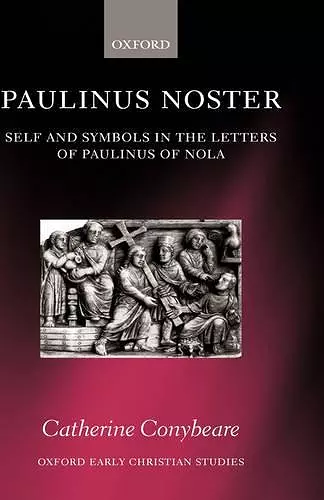Paulinus Noster
Self and Symbols in the Letters of Paulinus of Nola
Format:Hardback
Publisher:Oxford University Press
Currently unavailable, and unfortunately no date known when it will be back

The aristocratic convert, Paulinus of Nola, was revered by contemporaries and correspondents, like Augustine of Hippo and Sulpicius Severus, as Paulinus noster - 'our Paulinus'. But his role as a shaper of, and exemplar to, the early Christian Church has, until recently, been often overlooked. This literate and accessible study examines the profound impact Paulinus had on Christian thought during a crucial period of its development. His ideas on friendship, Christian symbolism, and the nature of personal identity were produced on the cusp of the transition from the classical world to the burgeoning Western Christian civilization by a thinker with strong links to both. Paulinus' letters and other writings reveal the roots of many important strands of Christian thought; the works of Augustine and others attest to this influence. The letters of Paulinus and his correspondents portray an early Christian 'web' of shared concepts, intellectual discussion, and group development. Catherine Conybeare examines how the very process of writing and transmitting letters between members of a far-flung community helped to bind that community together and to aid the creation of ideas which would continue to reverberate for centuries after. 'Our Paulinus' was key to that group iconic as a model of behaviour, as a conversion success story, and as a intellectual contributor able to bridge the old world and the new.
This book is well-written and highly informative. It is particularly accessible to non-specialists who can approach a relatively obscure figure thanks to Ms Conybeare's help. The many quotations give us a flavour of Paulinus as a writer, and they are all reproduced in Latin as well as in English translation, which gives the book an added usefulness to scholars. It will probably be some time before another book on Paulinus appears, and it will be difficult to surpass Ms Conybeare for lucidity. Those with an interest in late antiquity and the Christianisation of Roman society will want to acquire this book and ponder what it has to say about the world which we have inherited. * Churchman *
An intimate and accessible portrait of Paulinus ... Ms Conybeare brings out an added dimension which is frequently overlooked - the important role played by the letter carrier, who was also part of the message. * Churchman *
Paulinus and Augustine would no doubt be grateful for the publication of this book, bringing out as it does some of the richness of their writings, their theology, and their theories of personal identity, and it should be warmly welcomed by any reader interested in this fascinating period in the development of Christian culture. * Journal of Theological Studies *
This is an extraordinary book which deserves a very wide readership indeed. * The Expository Times *
A fine addition to the Oxford Early Christian Studies series and a worthy complement to Dennis Trout's masterful 1999 biography of Paulinus ... The primary audience for this book will be scholars of early Christian thought; but especially the first two chapters may be of interest to those working on classical epistolography. As well, the final chapter will be of relevance to both classicists and medievalists with interests in the history of the subject ... One of Conybeare's most compelling arguments in the book is her claim that we should view the letter not simply as a text but as an "historical event" -- in other words, as a performative act at a particular historical moment, of which the surviving text is but a trace remain ... stimulating and suggestive ... For scholars of late antique culture, Christian thought, and the Latin letter in general, Conybeare's study is a thought-provoking and welcome addition. * Bryn Mawr Classical Review *
ISBN: 9780199240722
Dimensions: 224mm x 146mm x 15mm
Weight: 351g
200 pages